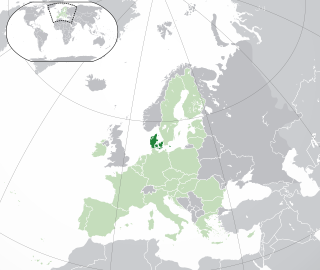
The Prime Minister of Greenland, officially referred to as the Premier, is the head of the Government of Greenland, the autonomous country within the Kingdom of Denmark. The incumbent Prime Minister is Kim Kielsen of the Siumut party. The Prime Minister is usually leader of the majority party in the Parliament of Greenland. Jonathan Motzfeldt became Prime Minister after home rule was granted to Greenland in 1979.
Siumut is a social-democratic political party in Greenland. The party was an observer affiliate of the Socialist International. Siumut is led by the current Greenlandic Premier Kim Kielsen. Until September 2014 it was led by Aleqa Hammond, who was the first woman to lead the party.
There are three types of elections in Denmark: elections to the national parliament, local elections and elections to the European Parliament. Referendums may also be called to consult the Danish citizenry directly on an issue of national concern.

Danish overseas colonies and pre Dano-Norwegian colonies are the colonies that Denmark-Norway possessed from 1536 until 1953. At its apex the colonies spanned four continents. The period of colonial expansion marked a rise in the status and power of Danes and Norwegians in the union. Being the hegemon of Denmark-Norway or the Statsfædrelandet, Denmark is where the union's monumental palaces are now located and Copenhagen, today the capital of Denmark, was the city which both Norway and Denmark came to establish as their capital. Much of the Norwegian population moved to find work in Copenhagen, attend university, or join the Royal Fleet.

This is a list of referendums related to the European Union, or referendums related to the European Communities, which were predecessors of the European Union. Since 1972, a total of 48 referendums have been held by EU member states, candidate states, and their territories, with several additional referendums held in countries outside of the EU. The referendums have been held most commonly on the subject of whether to become a member of European Union as part of the accession process, although the EU does not require any candidate country to hold a referendum to approve membership or as part of treaty ratification. Other EU-related referendums have been held on the adoption of the euro and on participation in other EU-related policies.
Greenland is divided into five municipalities – Avannaata, Kujalleq, Qeqertalik, Qeqqata, and Sermersooq – as well as the large Northeast Greenland National Park which is unincorporated. The Thule Air Base is administered by the United States Air Force and operates as an unincorporated enclave surrounded by territory of Avannaata.

Greenland, an autonomous constituent country of the Kingdom of Denmark is one of the EU countries’ overseas countries and territories (OCT). Greenland receives funding from the EU for sustainable development and has signed agreements increasing cooperation with the EU.

The term "the unity of the Realm" refers to the relationship between Denmark proper, the Faroe Islands and Greenland—three countries constituting the Kingdom of Denmark.
A non-binding referendum on Greenland's autonomy was held on 25 November 2008. It was passed with 75% approval and a 72% turnout. The referendum was announced by Prime Minister Hans Enoksen on 2 January 2008. Enoksen also announced the launch of an information and discussion campaign on the issue of self-government. This included town hall meetings throughout the country.

Prior to its secession from the European Community in 1985, Greenland was a constituency of the European Parliament for European elections.
The Greenlandic European Communities membership referendum, 1982 was a referendum over whether Greenland should continue to be a member of the European Economic Community which took place on 23 February 1982.

Royal Greenland A/S is a fishing company in Greenland, spun off from Kalaallit Niuerfiat in 1990 but still wholly owned by the Government of Greenland. The company operates in a number of towns and settlements in Greenland, with 20 fish processing plants and ship bases of local subsidiary units. Some of the processing plants were closed between 2007 and 2009. Royal Greenland had an annual net profit of DKK 335 million before tax in 2016.

Greenlandic independence is a political ambition of some political parties, advocacy groups, and individuals of Greenland, an autonomous country of the Kingdom of Denmark, to become an independent sovereign state.
This page is a historical timeline of the island known as Greenland or Kalaallit Nunaat.

Denmark in the European Union refers to the historical and current issues of Denmark's membership in the European Union. Denmark has a permanent representation to the European Union led by ambassador Jeppe Tranholm-Mikkelsen, in Brussels. The current Foreign Minister and Minister for European Affairs is Anders Samuelsen.
A two-part referendum on alcohol was held in Greenland on 20 June 1978. Voters were asked whether they approved of the banning or rationing of alcohol. The ban on alcohol was rejected by 55% of voters, whilst the rationing proposal was approved by 58% of voters.
Danish Greenlanders are Danish immigrants in Greenland and their descendants.

The County of Greenland was an amt (county) of Denmark, comprising Greenland and its associated islands, before home rule was granted to Greenland.










